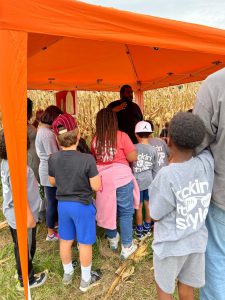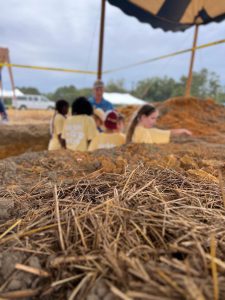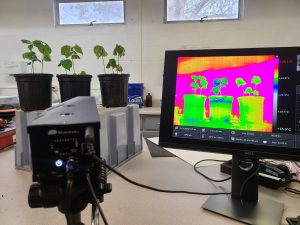Agriculture plays an important role in our society, yet a noticeable gap in understanding and engaging with this sector is evident among youth. Often, this disconnect stems from misconceptions about agriculture and the vast career opportunities it offers. Addressing these challenges requires long-term educational efforts that provide youth with hands-on experiences in the form of field excursions to increase interest and participation in Agriscience topics. The Ag Adventures program, an annual venture between UF/IFAS North Florida Research and Education Center (NFREC) and Florida 4-H, was created in response to this need. It aims to immerse students in the diverse and rich world of agriculture through experiential learning.

Ag Adventures connects youth from urban and rural areas to a large-scale farming research center, offering a firsthand look at agriscience topics in action.
Program Overview
For years, Ag Adventures has been actively engaging 4th and 5th graders from counties across the Panhandle. This program introduces students to several key subfields in agriculture, with an emphasis on sustainability:
- Soil Science: Students learn about the critical role of soil in natural ecosystems and agriculture. Hands-on experiences, such as exploring a soil pit, help youth gain a deeper understanding of soil science topics.
- Agricultural Technology: Students explore the latest innovations in precision agriculture, including drones and sensor technology, and their role in promoting sustainability and economic growth.
- Entomology: Focusing on the vital role of pollinators, students learn about the impact of insects on the ecosystem and our food supply. Field activities, like insect collecting, offer practical understanding of the importance of these animals and the need to protect them.
- Agronomy: By learning about crops such as corn, cotton, and peanuts, students gain insights into the economic and historical significance of agriculture in North Florida. Through this section, researchers and agents are able to showcases the diversity and complexity of plant science in a tangible way.

Students explore a soil pit, uncovering the hidden wonders of soil science and gaining hands-on insight into soil formation in our region.
Benefits of Field Excursions
Engagement in programs like Ag Adventures offers a multitude of benefits, equipping students with valuable insights and experiences that go beyond the traditional classroom. Such field excursions are important for:
- Strengthening STEM Appreciation: By contextualizing STEM concepts within the framework of agriculture, Ag Adventures bridges the gap between classroom learning and its practical applications. This approach not only enriches students’ understanding of STEM but can also spark their curiosity about agriscience.
- Facilitating Career Exploration: Ag Adventures provides a platform for youth to explore various careers in STEM. Through interactive experiences and exposure to academic pathways, the program demystifies agriculture, making it more accessible and relatable. This engagement broadens their career horizons and helps them envision a future where they can apply their learning in diverse ways.
- Bridging the Urban-Rural Divide: Ag Adventures offers youth from all backgrounds a chance to experience large-scale farming firsthand. By connecting youth directly with the source of their food, the program fosters a deeper appreciation for agricultural contributions and the interdependence between urban and rural communities.

Ag Adventures enables young learners to engage with faculty members and discover cutting-edge agricultural research. For example, NFREC researchers demonstrate the use of thermal imaging technology to detect drought stress in crops, showcasing practical applications of science in farming.
Conclusion
The Ag Adventures program enhances the educational experience of 4th and 5th graders by merging classroom learning with real-world agricultural practices. This initiative by UF/IFAS Extension deepens their appreciation for STEM, opens new avenues for career exploration, and introduces them to the unique aspects of rural life and agriculture. We hope students develop a more comprehensive understanding of the world, laying the foundation for them to become informed and engaged members of society.
This program occurs annually in the fall. If you are interested in your school participating, please contact your local UF/IFAS Extension office.
References:
Behrendt, M., & Franklin, T. (2014). A review of research on school field trips and their value in education. International Journal of Environmental and Science Education, 9(3), 235-245.
Jean-Philippe, S., Richards, J., Gwinn, K., & Beyl, C. (2017). Urban youth perceptions of agriculture. Journal of Youth Development, 12(3). https://doi.org/10.5195/jyd.2017.497
- 4-H Wildlife Judging Contest at the North Florida Fair - August 23, 2024
- Planning a Safe and Engaging Paddling Adventure for Youth Part 2 - March 28, 2024
- Planning a Safe and Engaging Paddling Adventure for Youth Part 1 - March 21, 2024
